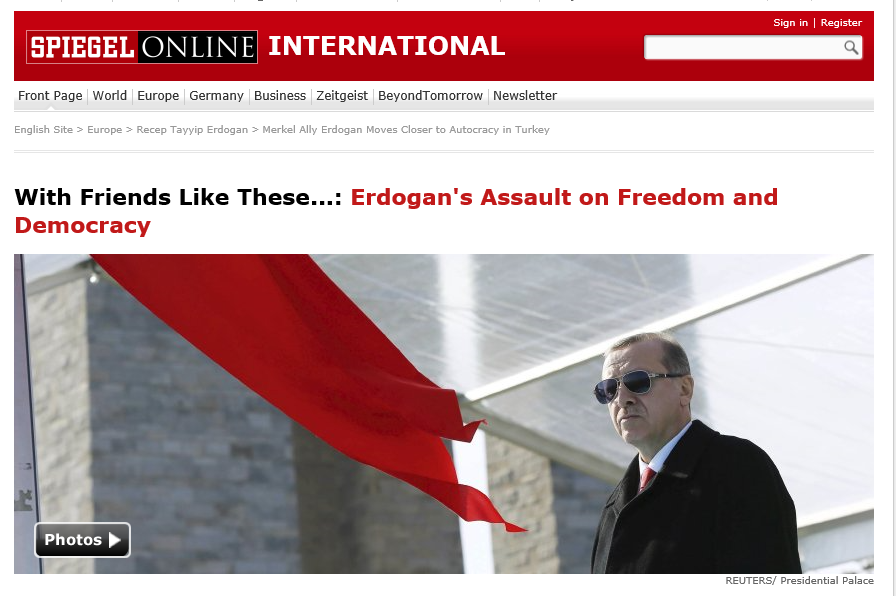Der Spiegel: Erdogan’s assault on freedom and democracy
This article in Der Spiegel dates back to April, but gives insight into Erdogan’s mentality and the current situation in Turkey. Here’s a particularly interesting bit, now that people have understood that they need to know more about the Turkish dictator.
—————-
Years ago, a US diplomat said: “Erdogan has the instincts of a street fighter.” Indeed, combat would seem to be Erdogan’s elixir of life. He needs enemies and has always worked against others on his climb to the top. His entire career has been based on a defeat that he transformed into victory. It came in spring 1998. At the time, he was the mayor of Istanbul, but his popularity was suffering due to accusations of corruption, and his party, the Islamist Refah, was banned.
The military government took him to court, in part because he had quoted verses in a speech a few months prior that seemed to prosecutors to be Islamist: “The mosques are our barracks, the domes our helmets, the minarets our bayonets and the faithful our soldiers.”
In the end, he only spent four months in prison, separated from the general prison population and in a cell with carpeting, freshly painted walls, a television and a refrigerator. Faithful Muslims have since honored him. They see Erdogan as a man who stood up to the military for the good of the country, as a defender of Muslims and as a hero.
In contrast to many high-ranking politicians, Erdogan is not a child of the secular establishment, but the son of a blue-collar worker. He grew up in the rough dockland neighborhood of Kasimpasa, with his family sharing an apartment in a wooden barracks with relatives.
His father Ahmet shipped goods across the Bosporus and raised Tayyip, his sister and three brothers as devout Muslims. Erdogan later said that his father once hung him up by the legs in punishment and he still today tells the story of how he used to kiss his mother’s feet. “My mother demurred, but I always told her, mother, that is the fragrance of heaven.”
Erdogan learned early on how to get his way, with force if necessary. As a child, he sold sesame rings on the street to earn money and elderly customers of a tearoom in Kasimpasa remember an angry young man. “Tayyip never turned away from a fight. He would climb up onto the roof of the mosque and recite verses from the Koran.” He played striker for Erokspor, a local soccer club and his friends called him “Imam Beckenbauer,” after the famous German footballer. His father, though, rejected the sport as un-Islamic because of the shorts they wore and sent his son to a religious Imam Hatip school.
The Istanbul bourgeoisie looked down on people like Erdogan, with new arrivals from Anatolia, like his family, being referred to as “black Turks.” Erdogan used the contempt as motivation. He studied business administration at Marmara University in Istanbul, joined the conservative Naksibendi fraternity and became involved in the Islamist political party of Necmetin Erbakan, who would later become prime minister.
Erdogan’s origins have molded his political style. If you want respect in Kasimpasa, you can never show weakness and never back down. There are only friends and enemies, black and white. Such are the rules of the street and the laws of the docklands. Still today, Erdogan views criticism as a personal affront, and when he feels insulted, he goes on the attack. His quick temper is feared.
After he was released from prison, he leveraged his rebel image into a political career. Just one year after its founding in 2002, he led his Justice and Development Party (AKP) to a surprising election victory, after which he put down the opposition and withstood overthrow attempts by the military and the judiciary.
Erdogan has now personified Turkey for more than 13 years, first as prime minister and then, since 2014, as president. He had a Sultan’s palace built for him in Ankara with 1,000 rooms. Yet he still presents himself to the electorate as an outsider, as the representative of oppressed, conservative Muslims.

